
PAGE group took part in the 31st SIEA Conference in Venice: the contributions focused on the twin transitions
On June 14th-15th, the PAGE group attended the 31st SIEA Conference, in Venice, “Innovazione digitale e ambientale per la sostenibilità dei modelli di business nell’agroalimentare” which focused on digital and environmental innovation to foster sustainable business models in the agri-food sector.
The Conference started with a keynote speech by Prof. Thomas P. Tomich (University of California), who talked about the relevance of Food Systems’ informatics and the related opportunities: supporting user-driven capacity, taking data-informed action and engaging and including several stakeholders from the system.
On the first day, during the parallel session dedicated to collaborative innovation ecosystems in the agri-food sector:
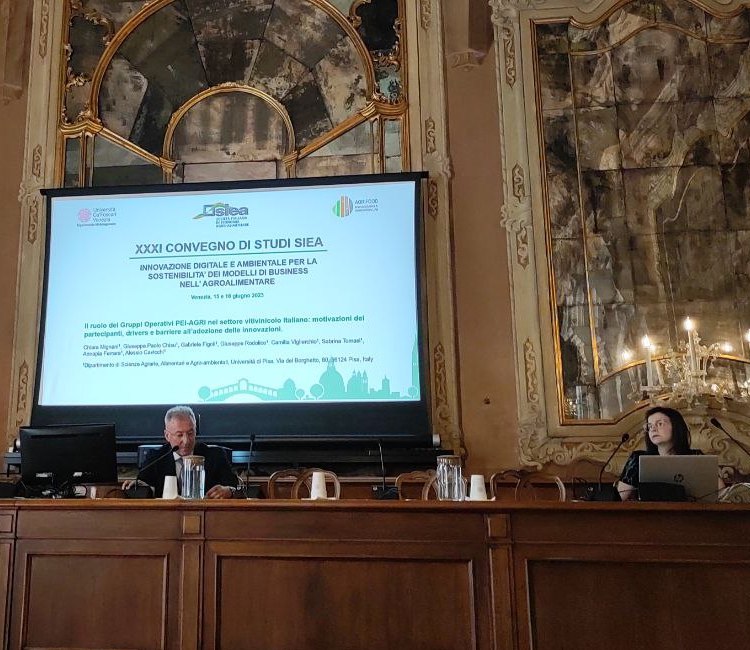
Chiara Mignani presented a contribution titled “The role of PEI-AGRI operational groups in the Italian wine sector: participants motivations, drivers and barriers of innovation adoption“. Through a quanti-qualitative approach (based on Piñeiro et al., 2021, and Molina et al., 2021), the study aims to investigate how the policies linked to the RDP’s financial cooperation activities can stimulate the adoption of innovations in the wine sector and identify how wine sector operators are experiencing new models of sustainable innovation, facilitating the ecological transitions of the agricultural sector. Initial findings show the importance of GOs as a useful tool for identifying new solutions, piloting innovations in agriculture, supporting dissemination mechanisms and knowledge exchange related to the introduction of new technologies.
Selene Righi presented a case study: “Integration and innovation in organic agriculture: a case from the Marche Region“.
The aim of the work was to analyse the demand for integration and digital innovation of a sample of 80 farmers in the Marche Region and to identify related significant factors, as well as whether organisational innovation could be considered a determining factor for the implementation of digital innovation. Data was analysed based on the “Innovation Diffusion Theory (IDT)”, through “Structural Equation Modelling (SEM)”. Results show that integration is a significant factor in facilitating the implementation of digital innovations and that, while it is important to innovate, it is also necessary for farmers to have the appropriate support to be able to implement such innovations.
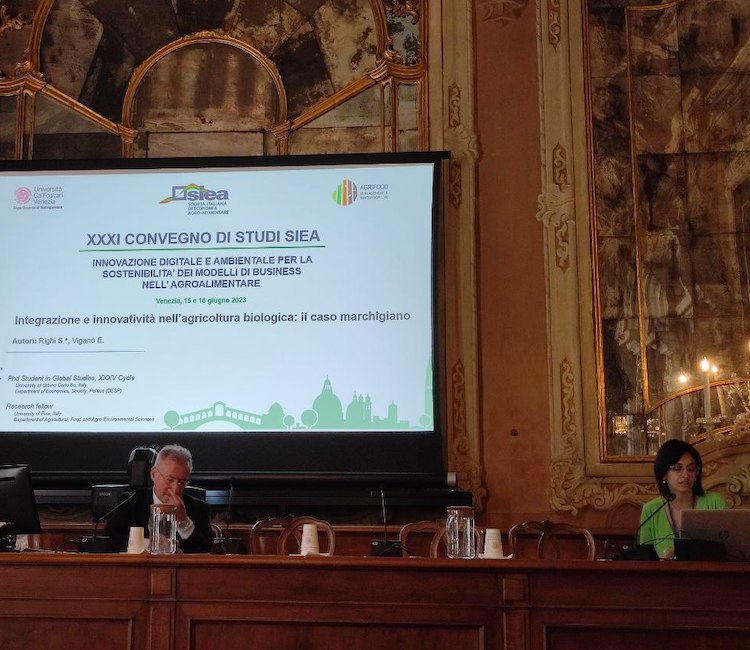
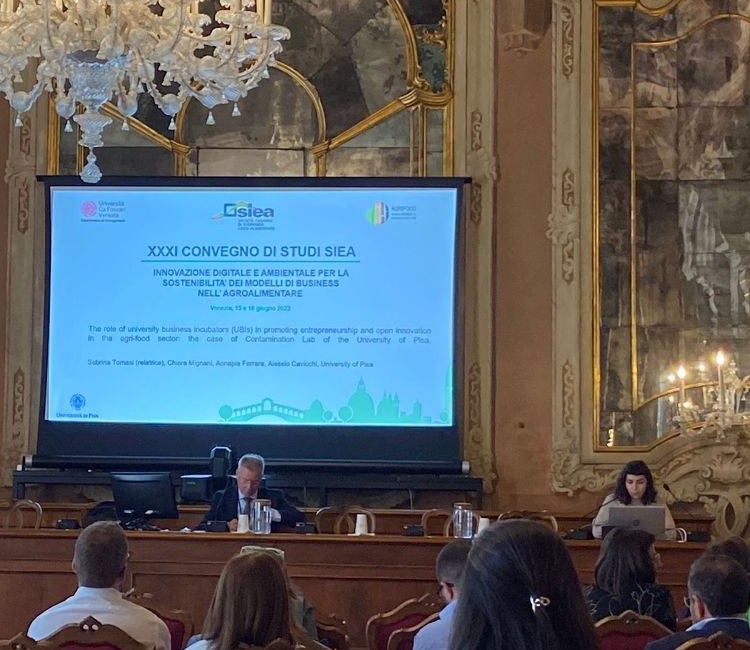
Sabrina Tomasi contributed with “The role of university business incubators (UBIs) in fostering entrepreneurship and open innovation in the agri-food sector: the case of the Contamination Lab (CLab) of the University of Pisa“. It applied qualitative semi-structured interviews (based on Nicholls-Nixon & Valliere, 2019, Li et al., 2020 and Al Sharif et al., 2022), to a purposeful sample of administrative staff and start-ups teams involved in the CLab’s activities. From a start-up’s perspective, UBIs support them by providing credibility & business assistance, networking opportunities – also internationally – and subsidised rental spaces & collectively shared facilities. At a regional innovation level, a challenge-based approach in response to place-based needs and the continous validation of the solutions developed by the start-ups, through the exchange with end-users, could foster UBIs’ contribution.
On the second day, as a keynote speaker in the first plenary session, Prof. Gianluca Brunori gave a speech titled “Agri-food systems transition towards sustainability: the role of digitalization”.
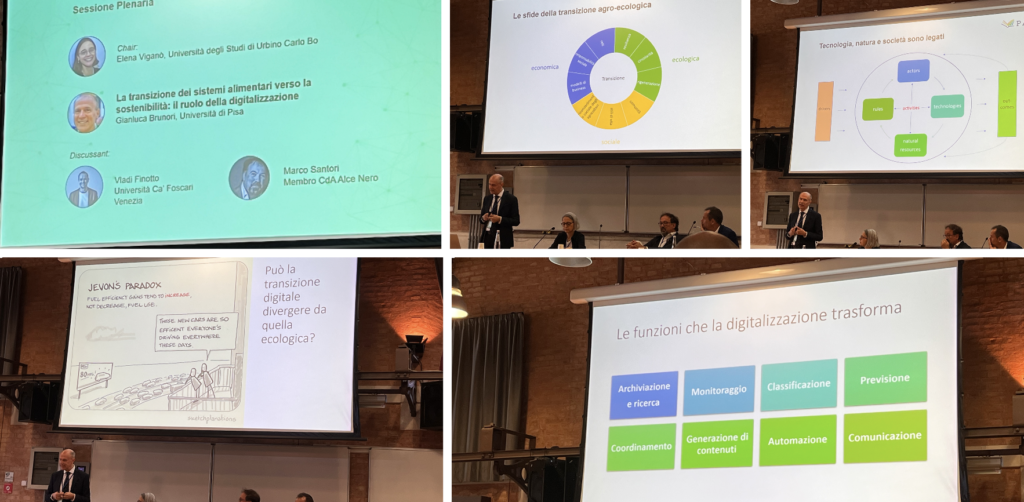
He stressed the several functions that, within a business, can be transformed through digitalisation, and the need to assess when digitalisation is sustainable and when it is not. He focused on the challenges of agroecology transitions and on innovation. To be effective, the latter has to be systemic, transformative and, above all, responsible.
During the last afternoon parallel sessions about theory, frameworks and practices for the twin transition, Prof. Cristina Santini, from the Telematic University of San Raffaele in Rome, presented a contribution – a multiple-case study – co-authored by Prof. Gianluca Brunori and Prof. Alessio Cavicchi, titled: “Blurring the agro-food boundaries: when competitiveness meets global challenges”.
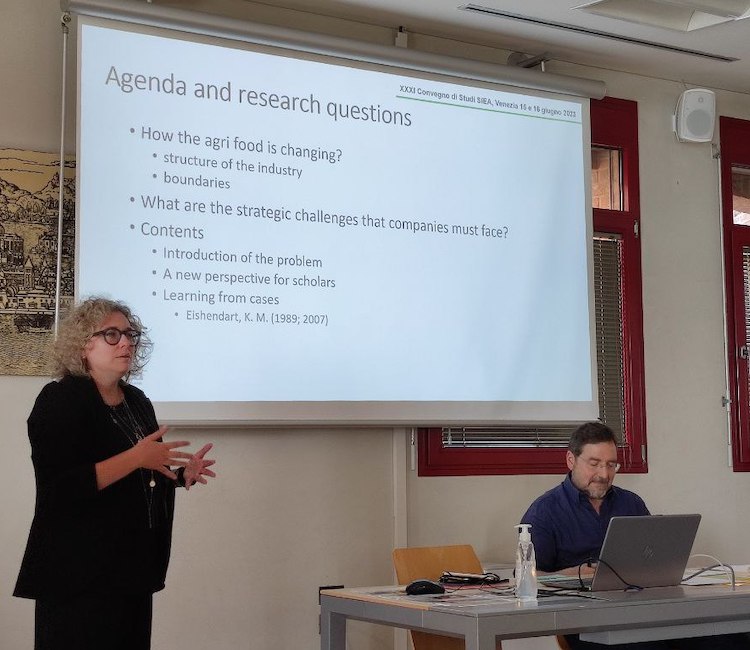
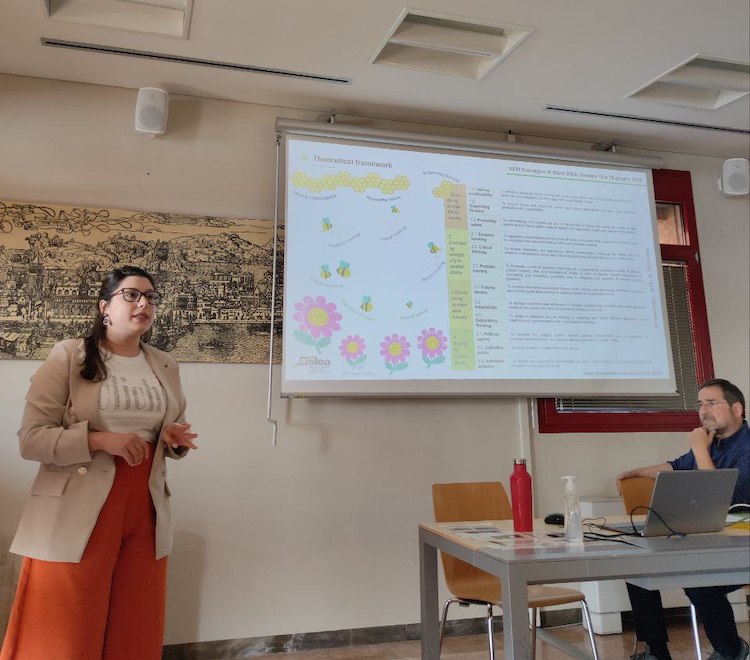
Finally, Annapia Ferrara closed the parallel session with a contribution titled: “Time for action: using service learning for the development of students’ sustainability skills in the agri-food sector”. The case describes a community service initiative involving the Department of Agriculture, Food and Environment of the University of Pisa and its students, asked to solve some sustainability challenges proposed by six no-profit organisations operating in Tuscany, by using design thinking. The study evaluates students’ acquisition of sustainability skills (ref. “GreenComp” framework by Bianchi et al., 2022), through questionnaires, student’s reflective journals and rubrics. The main results show students’ propensity for a collective and individual initiative towards sustainability and a good level of future literacy, as well as critical and exploratory thinking skills.
A great opportunity for the group to share experiences with other Italian colleagues and widen their perspectives on twin transition in the agrifood sector while enhancing the Italian research network on this matter.
References:
Al Sharif, R., Pokharel, S., Ayari, M. A., Essam, M., & Aqeel, S. (2022). Enabling Open Innovation in Digital Startups through the Incubation Program—A Case of Qatar. Sustainability, 14(11), 6557.
Bianchi, G., Pisiotis, U., Cabrera Giraldez, M., GreenComp The European sustainability competence framework (2022). No JRC 128040 Joint Research Centre (Seville site). Retrieved from https ://joint research centre ec europa eu/ greencomp european sustainability competence framework_en (last accessed: 11/07/2023).
Li, C., Ahmed, N., Qalati, S. A., Khan, A., & Naz, S. (2020). Role of business incubators as a tool for entrepreneurship development: the mediating and moderating role of business start-up and government regulations. Sustainability, 12(5), 1822.
Molina, N., Brunori, G., Favilli, E., Grando, S., & Proietti, P. (2021). Farmers’ participation in operational groups to foster innovation in the agricultural sector: An Italian case study. Sustainability, 13(10), 5605.
Nicholls-Nixon, C. L., & Valliere, D. (2019). A framework for exploring heterogeneity in university business incubators. Entrepreneurship research journal, 10(3), 20180190.
Piñeiro, V., Nieto-Aleman, P., & Corbí, J. M. (2021). Collaboration through EIP-AGRI Operational Groups and their role as innovation intermediaries´. New Medit: Mediterranean Journal of Economics, Agriculture and Environment= Revue Méditerranéenne dʹEconomie Agriculture et Environment, 20(3).

